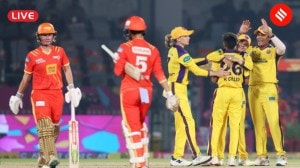The unknown soldier
Talk to a defence services officer for just a few minutes, even somebody you happen to run into at a party or in a train and you wonder how...

Talk to a defence services officer for just a few minutes, even somebody you happen to run into at a party or in a train and you wonder how he would ever find it worth his charging a pillbox. Poor wages, non-existent housing, civilian and political indifference, declining social status, the bitching is endless. The three chiefs have already resorted to the unprecedented step of jointly writing to the Prime Minister protesting the Fifth Pay Commission report.
Wait a moment before reacting with the usual, Aha! So cash is what it is all about8217; sentiment. Has this frustration stopped the Army from fighting in Kashmir? One look at the obituary columns also makes it pretty clear that it is no picnic out there. So if it isn8217;t just the money, what still motivates the soldier to walk the minefield? I raised the question once, in a slightly different context, with a young Garhwali jawan in the summer of 1992.
The Kashmiri insurgency was then at its peak. People in Srinagar8217;s old quarter had already set their watches to Pakistan time. The international media was full of abuse for the 8220;predominantly Hindu8221; Indian Army.
The Indian media was loaded with doubts on India8217;s claims on Kashmir as well as its Army8217;s ability to hold on to it. Kashmiris were calling the Army Indian dogs8217; and worse. So on a nightly patrol along the Haji Pir Pass, hoping to see a real skirmish, I asked the Garhwali jawan what kept him going in the face of such odds, particularly doubts on his country8217;s moral case on Kashmir.
The rifleman wasn8217;t foxed even for a moment. quot;How do these thing matter to me? I am the son of a farmer,quot; he said. quot;We never ask how our forefathers acquired the land. What we have inherited is ours. If you have a problem, come along with a lathi. If you win, you take it.8221;
Straightforward humble farmer8217;s logic. Also the reason why we have so far been able to take our armies for granted. The British built a peasant army around the martial races8217; pride in the profession of warfare and the farmer8217;s simple, unquestioning attitude towards the officer who came from such a different, higher social milieu.
They also institutionalised systems within the civilian setup to take special care of the soldiers8217; families, their land disputes and family sickness while they were away on field postings. But this began changing a decade ago with the arrival of the matriculate jawan the minimum qualification for all regiments except the Gorkhas, globalisation, private sector salaries and the rapid urbanisation of the Army8217;s catchment areas.
The problem is, most of the so-called martial races also represent some of the most upwardly mobile in India. Now, with the size of land holdings falling, the newer generation is more focused on white collar jobs and opportunities in business and enterprise.
Their aspirations are accordingly changing. Earlier, the generals sent their sons to the Army. In the seventies they switched allegiances to IAS, and lately to the foreign banks. A large number of today8217;s officers are the sons of former Junior Commissioned Officers JCOs. But ask a JCO today and his concern is the same as that of his officers8217;: medical college admissions, JEE, and SAT scores.
These changing aspirational levels and the narrowing socio-economic gap between the officer and the other ranks have created an entirely new Army which we, the coffee shop classes, cannot understand. We still identify the Army with spit and polish. But if you live in a big city, pause the next time you see senior officers waiting for the staff bus. Look under the brasshats and count the frayed shirt collars.
Our leaders are incapable of relating to this new soldier who knows the balance in his provident fund.
The British fully exploited the paradox of the professional peasant army. So did insensitive Indian governments notably in 1962, against China, in 1987 in Sri Lanka. It isn8217;t so simple any more. Today8217;s soldier understands the score better. The insensitivity of the civilian is nurturing a dangerous alienation in his mind. He realises that the upper class Indian thinks of his Army as a mercenary force which is good value for money, in much the same vein as the Saudis seemed to think of the Americans during the Gulf War.I did once ask an IPKF general if his Army was so rattled by the casualties in Sri Lanka, how would it ever handle a real war? He said the war was different. Once you believed the entire country was behind you, you did not bother about casualties. In Sri Lanka, it looked as if they had been hired to do somebody else8217;s dirty work.
Frighteningly, that feeling is now growing in Kashmir. Visit the family of Major Mohit Wigh, who walked a mine in Kupwara earlier this month, leaving behind his wife and two children, one of whom suffers from cerebral palsy. Wigh came from impeccable fauji stock. Son of a brigadier, he married the daughter of a Lieutenant General. No VIP in this town of nearly a thousand MPs and ministers bothered to ask what happened.
The media has ignored his tragedy it8217;s as if it is the Army8217;s private little affair. This is just one more example in this continuing callousness. When the IAF flew in the bodies of six Mahar soldiers killed in Somalia in what was internationally acknowledged to be a marvellous counter-ambush, not one political leader was at Palam. Only the distraught family members sat on the floor, waiting for the coffins.
Contrast this with the way the Americans received their Somalia casualties, or their concern for the F-16 pilot shot down in Bosnia. Remember how Karunanidhi refused to welcome the quot;killers of my Tamil brothers8221;, the returning IPKF, at Madras port and how V. P. Singh chickened at the thought of holding a proper ceremony and risking alienating his DMK allies. Surely you don8217;t expect civilians in peacetime to flock the highways to cheer Army convoys. But must we be so insensitive?
The point, therefore, is not money. There is indeed a case for reduction in manpower costs and a change in doctrine and strategy. But who is thinking about this? The security policy receives even less attention than power generation, which is such a mess.
This cannot go on. The Garhwali on the Haji Pir is a dwindling species, and why not? Why should only he remain rooted in the romantic yours not to reason why8217; tradition in a society where well-bred teenagers are being taught to salute the sensex instead of the flag?
- 01
- 02
- 03
- 04
- 05































